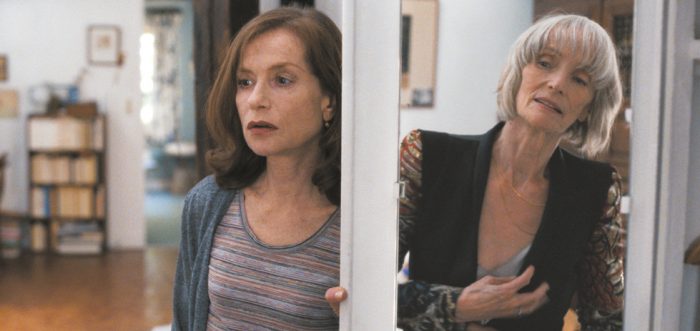
For me, screen legend Isabelle Huppert will always be the coffee-plantation boss Maria Vial from Claire Denis’ White Material (2009) – stubborn, decisive and utterly magnetic, stranded on a dirt road, while her world violently falls apart around her. Denis’ film was driven by Huppert’s star power, as if her camera found it impossible to lift its eyes from her. (Can anyone?) Mia Hansen-Løve’s Things to Come (L’avenir) provides an equally enrapturing platform for Huppert at her finest. Instead of post-colonial Africa, L’avenir navigates Hansen-Løve’s creative heartland, Paris, and the film’s crumbling structures include a 25-year marriage, an ailing mother, and two children leaving home. That this set of circumstances is not treated as a straight-up crisis for Huppert’s character, Nathalie – What ever will I do without my husband and kids?! – but rather an opening for self-definition is part of what imbues the film with such grace.
As is Hansen-Løve’s style, key events do not play out in high-pitched drama but are observed with restraint. Exposition is minimal, moral lessons are spare; these brief, no-fuss encounters and pragmatic telephone calls pass quickly. Her films are far less concerned with the events themselves than they are with capturing the tiny details and emotions of what happens next; what does a late middle-aged woman do when her husband unexpectedly leaves, her children fly the coop and her mother is increasingly dependant upon her (and the city’s firefighting force)? How do you depict such private loss over a series of years? The anti-moper to Goodbye First Love’s teary Camille, Nathalie responds with defiance: she is rarely still, often chasing something, someone, be it a wandering cat, a train back to the city or an elusive phone signal. These images come together to form an incredibly rich portrait of transition and possible renewal.
In the past, Hansen-Løve has spoken about the way her four previous features all follow a protagonist with a strong vocation: a poet (All Is Forgiven), an independent film producer (Father of My Children), an architect (Goodbye First Love) and a house music DJ (Eden). Continuing this trend, her fifth frames Nathalie through her life’s work as a high-school philosophy teacher. Part ode to Hansen-Løve’s parents, who were both philosophy professors, Nathalie embodies glimmers of everybody’s favourite teacher: she is a brilliant thinker but one also dedicated, sensual and somewhat fragile. She fights – no longer for revolution; “I think I am too old for radicalism,” she tells one young anarchist – but to encourage her students to think for themselves. When she walks between their desks quoting Jean-Jacques Rousseau and Blaise Pascal, it feels like she is addressing herself as much as her students, with whom she maintains close friendships.
From the film’s opening scenes of the family paying their respects at François-René de Chateaubriand’s grave on the island of Grand Bé, Things to Come presents a case for the intellectual life with more tenderness and gratitude than many contemporary dramas of young, “struggling” artists – perhaps thanks to the 35-year-old director’s confessions of feeling out of sync with her generation and to the film’s jump to a vantage point of the other side of a career. Nathalie looks back over her life and finds nourishment in her students, nature, and the books that line her home and form some of her dearest companionships. “I’m lucky to be fulfilled intellectually – that’s reason enough to be happy,” she tells her favourite former student (Roman Kolinka), her expression bearing shades of self-deception reminiscent of Maria Vial, both inspiring and breaking our hearts.
The film is not without levity, though. From tossed-off one-liners including, to her ex-husband Heinz (André Marcon), “Now you have your Schopenhauer so it’s all going to be okay,” to disarming, symbolic images of Nathalie rattling a container of dry cat food towards the forest’s edge, trying to lure back her runaway cat, the film balances its deep melancholy with humour. In one particularly hysterical scene, Nathalie goes to the cinema and we catch a glimpse of the projected film, Abbas Kiarostami’s Certified Copy – a nod to another cinematic portrait with a strong philosophical bent – before an amorous creep starts moving in on Nathalie, stroking her leg and then seating himself directly behind her. “Ooh la!” she squeals, fleeing his advances.
Hansen-Løve wrote Huppert’s part with the actor in mind, and Things to Come makes terrific use of her many shades of vulnerability and power to pull out real warmth from what could otherwise be very dark subject matter. In the film’s final scene, an exquisite, golden-toned cover by The Fleetwoods of “Unchained Melody” plays as we watch Nathalie cradle her grandchild, her children and daughter’s partner seated in the adjoining room for Christmas lunch, the scene washed over by the song’s message of helplessness before the infinite advances of time.
